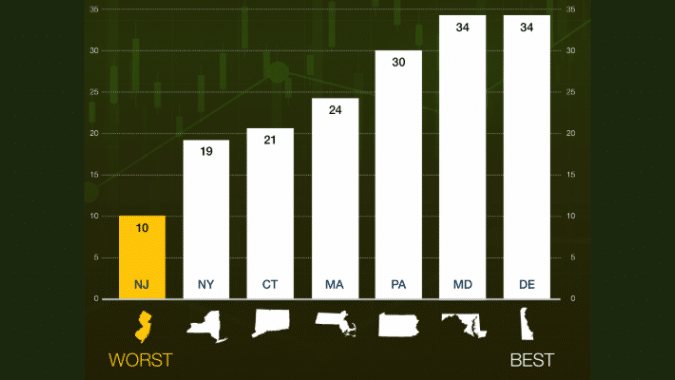NJBIA released its 2024 Regional Business Climate Analysis showing New Jersey continues to remain last in the region by a wide margin in terms of business taxes and cost competitiveness.
The analysis, found here, shows New Jersey maintaining the highest corporate business tax rate and property tax paid as a percentage of personal income in the region.
New Jersey also has the second highest rate in the remaining four categories: top income tax rate, state sales tax, minimum wage and maximum unemployment insurance tax contribution per employee.
New Jersey’s top corporate rate is measured at 9% in this year’s analysis, following Gov. Phil Murphy’s commitment to sunset a temporary 2.5% surtax on the state’s largest employers on Jan. 1.
However, he did a sudden about face and reversed that sunset with a new and permanent 2.5% Corporate Transit Fee, retroactive to Jan 1, in his FY25 budget proposal.
This would return the state’s top earning companies to extreme national outlier status for corporate taxes at 11.5%.
“Over the past year, our policymakers publicly acknowledged that New Jersey is an expensive state to do business and affordability and regional competitiveness were important factors for our economy,” said NJBIA President and CEO Michele Siekerka. “Sadly, their actions ignore their words and being a national outlier appears irrelevant to them when it comes to competitiveness.
“What our policymakers also miss is the fact our businesses rely on their word and actions when considering making investments. While the tax hike alone is bad enough, the way we are getting there, through broken promises and lack of notice, sends a clear message that our job creators don’t matter.
“Beyond the numbers showing New Jersey as an outlier of cost-drivers for business, we appear to have a mindset that it’s OK to make it worse. It’s a sad time for New Jersey’s business community when the negative attitude toward our top employers falls in line with our negative numbers. We must do better for business.” BREAKING DOWN THE DATA
Each year, NJBIA’s annual Regional Business Climate Analysis, prepared by Director of Economic Policy Research Kyle Sullender, scores six individual business cost drivers that measure business competitiveness in seven states.
State rates in each category are scored from 1 (least competitive) to 7 (most competitive).
New Jersey’s overall business climate score (10 points) was the lowest for the sixth straight year.
Maryland and Delaware both tied for a top score of 34. Pennsylvania finished third with 30 points, followed by Massachusetts (24), Connecticut (21) and New York (19).
New Jersey’s current top 9.0% corporate business tax rate is the highest in the region, ahead of Delaware (8.7%) and Pennsylvania (8.49%). The Keystone State, however, is on a path to reduce its top corporate rate to 4.9% by 2031.
Compared to the six other states, New Jersey also has the top property taxes paid as a percentage of income at 4.76% – which is down from 4.98% two years ago.
For the third straight year, New Jersey’s top income tax rate of 10.75% has been surpassed by New York’s top rate of 10.9%.
Beginning with last year’s analysis, NJBIA has adjusted its unemployment insurance tax category to represent the maximum UI contribution per employee, which is calculated by multiplying each state’s taxable wage base and maximum tax rate.
With this metric, New Jersey is the second highest in this category at $2,630.40 – a whopping $507.60 increase from last year due to increases in both the taxable wage base and maximum tax rate. Massachusetts maintains the highest maximum UI contribution per employee at $2,935.50.
Connecticut currently has the top minimum wage rate of $15.69 per hour. New Jersey’s current minimum wage of $15.13 is the second- highest in the region.
To account for both state and local sales taxes, NJBIA’s sales tax metric combines each state’s statewide sales tax rate with the average of any local sales taxes collected by local governments.
As a result, New Jersey finished with the second-highest rate at 6.61% – a good distance behind New York’s 8.53%.
“New Jersey businesses are in a tax rut and it doesn’t appear there are any mechanisms to drive them out of it,” Sullender said.
“A $1-billion-plus UI tax increase on employers after the pandemic, which could have been mitigated with federal COVID relief dollars, has greatly increased what employers pay every week for every employee.
“With the proposal of a new and permanent 2.5% corporate income surtax, it appears New Jersey will remain a regional and national outlier for business cost drivers,” Sullender said.

